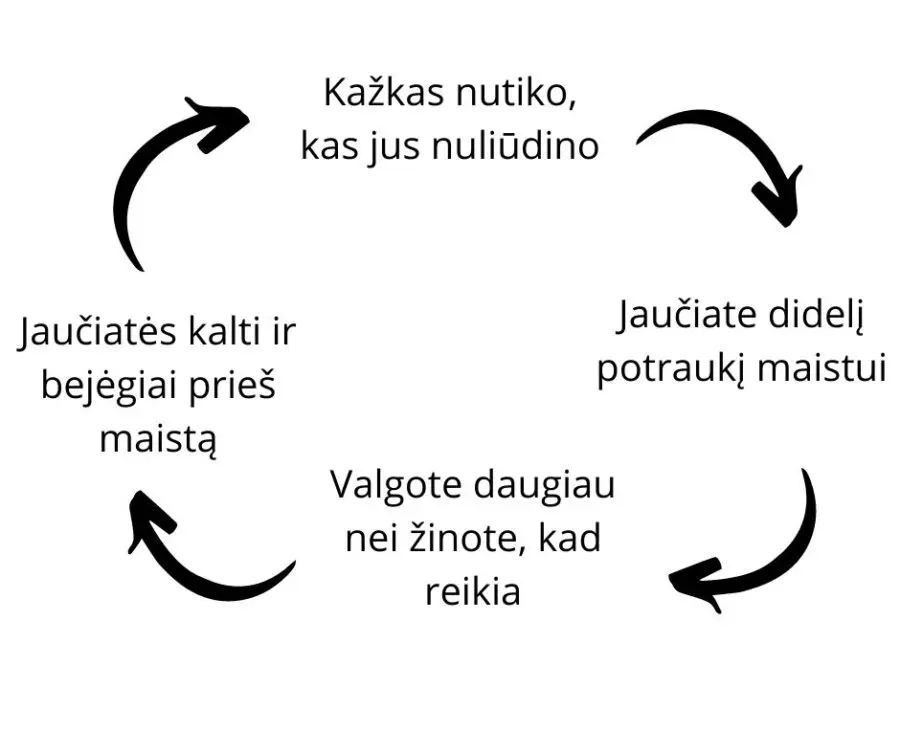Do you eat to feel better or to relieve stress? Below are some tips that can help you become more aware of and stop emotional eating, fight the urge to overeat, identify the real causes, and find more ways to satisfy your feelings.
What is emotional eating?

We don't always eat just to satisfy physical hunger. Many of us also eat to feel comfortable, to cut back stress would we reward ourselves. And when we do, we tend to eat fast food, sweets, and other comforting treats, but unfortunately, they're usually unhealthy foods. We can grab an ice cream cone when we're not in the mood, order a pizza if we're bored or lonely, or stressed after a busy day at work.
Emotional eating is using food to make us feel better, to fill our emotional needs rather than our stomach. Unfortunately, emotional eating does not solve emotional problems. In fact, it usually makes you feel worse. After all this, not only does the original emotional problem remain, but we also feel guilty for overeating again.
For some people, this cycle of trying to cope with food leads to feelings of guilt and shame—more difficult and painful feelings.
Does emotional eating affect me?
- Do you eat more when you're stressed?
- Do you eat when you are not hungry?
- Do you eat to feel better (to calm down)?
- Do you reward yourself with food?
- Does food make you feel safe?
- Do you think food is like your friend?
- Do you feel weak or powerless and unable to control yourself when food is around?
The cycle of emotional eating
Sometimes using food as a reward for achieving results or eating during a celebration is not necessarily a bad thing. But when eating is your primary emotional coping mechanism—when your first impulse is to open the fridge when you're stressed, upset, angry, lonely, exhausted, or bored—you're stuck in an unhealthy cycle where the real feeling or problem is never addressed.
The cycle of emotional eating in fig.

Emotional hunger cannot be satisfied with food. Eating may feel good at the time, but the feelings that caused the eating are still there. And you often feel worse than before because you have loaded your body with unnecessary calories. You blame yourself for making a mistake and not having enough willpower.
The problem with all of this is that you stop learning healthier life routines, how to deal with your emotions, you find it harder and harder to control your weight, and you feel more and more powerless over both food and your feelings.
No matter how powerless you feel, positive change can be made. You can learn healthier routines to deal with your emotions, avoid triggers, conquer cravings, and ultimately stop emotional eating.
Difference between emotional hunger and physical hunger?
Before you can break free from the cycle of emotional eating, you must first learn to distinguish between emotional hunger and physical hunger. This can be more difficult than it seems, especially if you regularly use food to cope with your feelings.
Emotional hunger can be powerful, so it's easy to confuse it with physical hunger. But there are clues that show you how to distinguish between physical and emotional hunger.
Emotional hunger comes on suddenly. It hits you instantly and you feel very hungry and want to satisfy that need immediately. Physical hunger, on the other hand, occurs gradually. The urge to eat is not as strong or requires immediate gratification (unless you haven't eaten in a very long time).
Emotional hunger craves specific foods. When you're physically hungry, almost any food seems good to you, including healthy things like vegetables. However, emotional hunger craves fast food or sugary snacks that provide instant satisfaction. You think you need apple pie or pizza, and nothing else will do.
Emotional hunger often leads to mindless eating. You've eaten an entire bag of chips or an entire carton of ice cream without really noticing or really enjoying it at all. When you eat in response to physical hunger, you tend to focus on eating.
Emotional hunger is not suppressed when you are already full. You constantly want more and more, often eating until you feel complete physical discomfort. On the other hand, physical hunger goes away when you eat a full meal. You feel satisfied when your stomach is full.
The seat of emotional hunger is not in the stomach. Instead of a growling stomach, you feel your hunger as a craving that can't get out of your head. You focus on taste and smell.
Emotional hunger often leads to feelings of regret, guilt, or shame. When you eat to satisfy physical hunger, you're unlikely to feel guilty or ashamed because you're simply giving your body what it needs. If you feel guilty after eating, it's probably because you know deep down that you're eating for no apparent reason.
Comparison:
| Emotional hunger versus physical hunger | |
| Emotional hunger comes on suddenly | Physical hunger occurs gradually |
| Emotional hunger longs to be satisfied immediately | Physical hunger can wait |
| Emotional hunger craves specific foods | Healthy food is also suitable for satisfying physical hunger |
| For emotional hunger, it is not enough that you are already full | Physical hunger disappears when you eat |
| Emotional eating causes negative emotions | Eating when you are physically hungry doesn't make you feel bad emotionally |
Identify the causes of emotional eating
The first step in stopping emotional eating is to identify the factors that trigger this craving. What situations, environments or feelings make you seek comfort in the "cover" of food? Most emotional eating is associated with unpleasant feelings, but it can also be triggered by positive emotions, such as rewarding yourself for reaching a goal or celebrating a holiday.
The most common causes of emotional eating

Stress. Have you ever noticed how stress makes you hungry? It's not just in your head. When stress is chronic, a frequent guest in our chaotic, fast-paced world, your body produces high levels of the stress hormone cortisol. Cortisol causes cravings for salty, sweet, and fried foods—foods that give you energy and a sense of pleasure. The more out-of-control stress in your life, the more likely you are to turn to food for emotional support.
Unexpressed emotions. Eating can be a way to temporarily silence or "freeze" uncomfortable emotions, including anger, fear, sadness, anxiety, loneliness, resentment, and shame. When you eat, you can avoid difficult emotions that you prefer not to feel.
Boredom or feeling empty. Have you ever eaten just to give yourself something to do, relieve boredom, or as a way to fill a void in your life? You feel empty and food is a way to occupy your mouth and time. At this point, it fills you up and distracts you from the underlying feelings of meaninglessness and dissatisfaction with your life.
Childhood habits. Recall your childhood memories of food. Did your parents reward you for good behavior with ice cream, bought you treats. These habits can often be carried over into adult life. Or your eating may be fueled by nostalgia — cherished memories of being with your parents and having a good time.
Social influence. Eating with other people is a great way to reduce stress, but it can also lead to overeating. It's easy to overeat because food is everywhere and because everyone else around is eating. You may also overeat because you feel socially awkward. Or maybe your family or circle of friends encourage you to overeat, and it's easier to follow others than lead by example yourself.
An emotional eating diary
You probably recognize yourself in at least a few of the previous descriptions. But even so, you'll want to get even more specific ways. One of the best ways to identify your emotional eating patterns is to keep a food and mood diary.
Every time you overeat or feel compelled to reach your psychological comfort level of eating, take a moment to figure out what triggered the urge. If you step back and take a sideways look, you'll usually find a sad reason for the emotional eating cycle to kick in. Write down everything in your food and mood diary: what you ate (or wanted to eat), what upset you, how you felt before you ate, how you felt during the meal, and how you felt after.
You will see a pattern over time. Maybe you always reach for food after spending time with a certain person. Or maybe you eat when you're pressed for time or when you have a family function to attend to. Once you identify your emotional eating triggers, the next step is to find healthier ways to feed your feelings.
Find another way to feed your feelings
If you don't know how to control your emotions while staying away from food, you won't be able to control your eating habits for very long. There are many diets, but they often fail. Although they offer logical nutritional advice, they only work if you consciously control your eating habits. It doesn't work when emotions cloud the logical decision-making process, demanding immediate food.
To stop emotional eating, you need to find other ways to emotionally redirect yourself. It is not enough to understand what emotional eating is and why it occurs, although these are already strong steps forward. You need food alternatives that you can turn to when you need emotional satisfaction.
Alternatives to emotional eating
If you are depressed or lonely, call someone who always makes you feel better. If it is difficult to call, just write a message "How are you?" If you have pets, it's time to keep them busy too. It also helps, even looking at old photos of you doing something with other people.
If you suffer from anxiety, release your nervous energy by dancing to your favorite song, taking a brisk walk or expressing your emotion at full volume.
If you are exhausted, treat yourself to a hot cup of tea, take a bath, light some scented candles or wrap yourself in a warm blanket.
If you are bored, read a good book, watch a comedy show, go outside, or remember something that interests you (crafts, playing a musical instrument, sports, planning for the future, etc.).
How to stop when food cravings hit?
Most emotional eaters feel powerless over their food cravings. When a sudden urge to eat comes, that's all you think about. At that moment, you feel an almost unbearable tension that demands to be fed, right here and now! Kogero, you have tried to resist before but failed and feel that your willpower is not enough. But it's really quite different and you have more inner strength than you think.
5 minute break
Emotional eating is usually automatic and almost mindless. It is possible that you will catch yourself when you have already eaten half of the ice cream container. But don't rush to blame yourself and think better, "talk to yourself" that you can make a decision yourself.
Can you delay eating for five minutes? Or start with at least one minute. Don't tell yourself you can't give in to desire; Remember that everything that is forbidden is at the same time very tempting. Just say to yourself, for example: "I'll wait a bit and clean the kitchen."
While you're cleaning the kitchen or walking the dog, keep an eye on yourself. how are you feeling What is happening in your emotional world? Even if you end up eating anyway, you'll have a much better understanding of why you're doing it. This will help you find the gap faster and more accurately next time.
Let's accept our emotions, whatever they are
While it may seem like the main problem is that you are powerless over food, in reality, emotional eating occurs because you feel powerless over your emotions. You don't feel able to deal with your feelings, so you cover them up with food.
Allowing yourself to feel unpleasant emotions can be scary. You may fear that once you let them flow through you, you won't be able to stop them. But the truth is that when we don't suppress our emotions, even the most painful and difficult feelings come out pretty quickly and lose their power to control us.
In order to manage, you must be mindful and learn to be in touch with your current emotional state. This can help you curb stress and correct the emotional issues that often lead to emotional eating.
Indulge and enjoy
When you eat to feed your feelings, you tend to do it very quickly and just mindlessly consume food on autopilot. You eat so fast and you don't realize that there are different tastes, and you don't feel your body saying "STOP I'm full". But by slowing down your eating just a little bit and savoring every bite, you'll not only enjoy your food much more, but you'll also be less likely to overeat.
Taking your time and enjoying your food is an important aspect of mindful eating, the exact opposite of mindless, emotional eating. Take a few deep breaths before you start eating and focus your attention on the eating process. Pay attention to your food, its shapes, colors and smells. What taste do you feel? How does your body feel?
By eating at a normal pace this way, you'll find yourself appreciating each bite of food more and more. You can even enjoy your favorite foods and feel really good. It takes time for your body's feeling of fullness to reach your brain.
Encourage your healthy habits
When you are physically strong, relaxed and well-rested, you are better able to handle the distractions that life inevitably throws at you. But when you're already exhausted, any small deviation can throw you off track and head straight for the fridge. Vaginal, sleep, and other healthy lifestyle habits will help you get through tough times by avoiding emotional eating.
Daily exercise is a priority. Physical activity does wonders for your mood and energy levels and is a powerful stress reliever. And getting on an exercise bike is easier than you think. You feel better after exercise. Therefore, you will want to continue.
Get 8 hours of sleep every night. When you don't get the sleep you need, your body craves sugary foods to give you a quick burst of energy. Getting enough rest will help control your appetite and reduce food cravings.
Take time to rest. Allow yourself at least 30 minutes every day to relax, dream and slow down. This is your time to take a break from your duties and recharge your batteries.
Communicate with others. Don't underestimate the importance of close relationships and social interaction. Spending time with positive people who make your life better will help protect you from the negative effects of stress.
It is important to remember that everyone's health is individual and there is no one-size-fits-all recipe!
So, if you are looking for ways to strengthen your body, have energy and avoid mood swings and regain peace of mind, health professionals recommend Testa "Your Day".
*In time, pay attention to the signals sent by your well-being;
*Replenish the body with natural minerals or vitamins;
*Enjoy energy and good mood every day!
† Our website provides general information only. If you have a specific illness or are taking additional medications or supplements, consult your doctor or pharmacist.












One comment on “Emocinis valgymas ir kaip jį sustabdyti?”
Irene
Hello, a 12-step program, similar to Alcoholics Anonymous, really helped me. I realized that there is a real addiction to food. I lived to eat, not to eat to live. A true obsession. In order to control my weight, I did a lot of sports, I didn't eat at all for days. At one point, the weight had dropped to a completely unhealthy level. Other times I gained weight. Know that this is a real disease and not a lack of will. But dear ones, there is a way out of this suffering. You are not alone. There is a 12-step program and foodies anonymous meetings. If you are interested, please contact - oanewcomermeeting@gmail.com